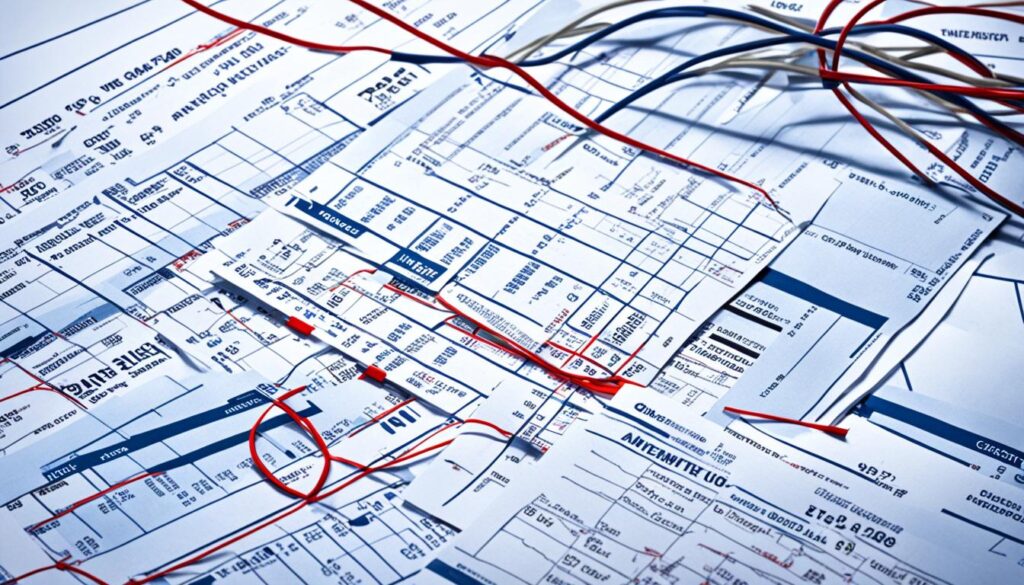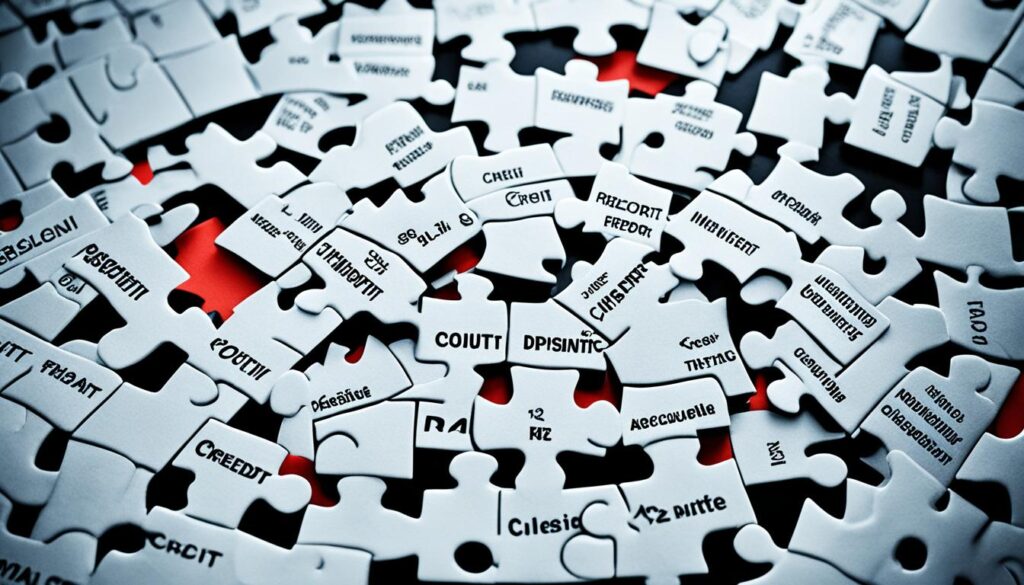Dealing with collections on your credit report can be challenging. Understanding how to dispute these entries is key to maintaining good financial health. This guide covers the best reasons for disputing collections on your credit report.
Collections can hurt your credit score badly. This makes getting loans or good interest rates harder. But don’t fret! You can challenge wrong entries and boost your credit standing.
This guide will help you with outdated debts, wrong identities, and reporting errors. We’ll look at common dispute reasons and how to handle each one well.
Key Takeaways
- Understanding the impact of collections on your credit score
- Identifying valid reasons for disputing collection entries
- Learning the step-by-step process of filing a dispute
- Recognizing your rights under credit reporting laws
- Exploring strategies to prevent future collection issues
- Knowing when to seek professional help for complex cases
Understanding Collections on Credit Reports
Credit report collections can seriously affect your finances. They show up when unpaid debts go to collection agencies. Let’s look at collections, their impact, and common types.
What are collections?
Collections happen when creditors give up on collecting a debt from you. They might sell the debt or hire an agency to get payment. This creates a new entry on your credit report.
Collections often cause major damage to your credit score. They can make it harder to get loans or credit cards.
How collections impact your credit score
One collection can lower your credit score by 50 to 100 points. This negative mark usually stays on your report for seven years. The impact decreases over time, but it can still affect your borrowing options.
Types of collections commonly reported
Various debts can end up in collections:
- Medical bills
- Credit card balances
- Utility payments
- Personal loans
- Cell phone bills
Check your credit report often for any errors. Wrong collection entries can hurt your credit score unfairly. If you find mistakes, dispute them right away.
Protecting your financial standing is important. Regular reviews can help you catch and fix problems quickly.
The Importance of Disputing Inaccurate Collections
A clean credit report is vital for your financial well-being. Incorrect collections can hurt your credit score badly. This can make getting loans, apartments, or jobs much harder.
Act fast when you see errors on your report. Disputing wrong collections can boost your credit score significantly. This involves contacting credit bureaus and proving that certain collections don’t belong on your report.
“Your credit report is your financial resume. Keep it accurate and up-to-date to ensure the best financial opportunities.”
Winning disputes can bring many benefits. These include a better credit score and improved loan terms. You’ll also have higher chances of getting credit cards and rental approvals.
- Improved credit score
- Better loan terms
- Increased chances of approval for credit cards
- Enhanced rental application success
Here’s how disputing wrong collections can affect your credit score:
| Credit Score Range | Potential Increase After Dispute | Time Frame |
|---|---|---|
| 300-579 (Poor) | 50-100 points | 30-60 days |
| 580-669 (Fair) | 20-50 points | 45-90 days |
| 670-739 (Good) | 10-30 points | 60-120 days |
To win credit report disputes, be persistent and keep detailed records. Don’t let wrong info stop you from reaching your money goals. Take action to dispute credit report errors today.
Best Dispute Reason for Collections on Credit Report
Knowing the best reasons to dispute collections can significantly impact your credit report. Understanding valid grounds for challenging these entries is crucial. Let’s explore top reasons to dispute collections effectively.
Debt is not yours
Dispute any collection that doesn’t belong to you immediately. This could be due to identity theft or a name mix-up. Gather identity proof and documents showing you’re not linked to the debt.
Incorrect amount reported
Sometimes, the reported collection amount is wrong. Compare the sum with your records. If there’s a mismatch, dispute with evidence of the correct amount owed or paid.
Account already paid or settled
Is a paid or settled debt still showing as a collection? This is a common error. Collect proof of payment or settlement agreement to support your dispute.
Collection is too old to report
Most negative items should disappear from your credit report after 7 years. If you see an outdated collection, dispute it. The credit bureau should remove it once notified.
When filing a dispute, be clear and provide solid evidence. This approach increases your chances of resolving inaccurate collections on your credit report.
Preparing to Dispute Collections

Thorough preparation is key to disputing credit report collections successfully. Proper groundwork can make or break your dispute process. Let’s look at the essential steps for getting ready.
Start by getting your credit reports from all three major bureaus. Check these reports closely and mark any incorrect collection accounts. This step is crucial for writing an effective dispute letter.
Next, collect all documents that support your case. These may include payment receipts and letters from creditors. Organizing these papers will help when you’re ready to dispute credit report collections.
Make a timeline of events related to the disputed collection. This helps present a clear story of what happened. Accuracy is vital when challenging collections on your credit report.
“Preparation is the key to success. The more organized you are, the more likely you are to achieve a positive outcome in your dispute.”
Use a dispute letter template to include all necessary information. Many websites offer free templates for credit report collections dispute letters. Adjust these templates to fit your specific situation.
| Preparation Step | Why It’s Important |
|---|---|
| Obtain credit reports | Identifies all collection accounts to dispute |
| Gather documentation | Provides evidence to support your claim |
| Create timeline | Helps present a clear account of events |
| Use dispute letter template | Ensures all necessary information is included |
Following these steps will prepare you to dispute credit report collections effectively. Good preparation greatly improves your chances of a successful dispute.
The Credit Report Collections Dispute Process
Improving your credit score? Learn how to dispute collections on your credit report. This guide will help you through the process step by step.
Gathering Necessary Documentation
Start by collecting all relevant documents. This includes account statements, payment records, and creditor correspondence. These papers will strengthen your case and speed up the dispute process.
Contacting Credit Bureaus
Reach out to Equifax, Experian, and TransUnion to start your dispute. You can do this online, by mail, or phone. Each bureau has its own procedures.
Familiarize yourself with their specific requirements. Learn more about the dispute process to ensure you’re following the correct steps.
Following Up on Disputes
After submitting your dispute, mark your calendar for follow-ups. Credit bureaus typically have 30 days to investigate and respond. If you don’t hear back, contact them again.
| Step | Action | Timeline |
|---|---|---|
| 1 | Gather Documents | 1-2 weeks |
| 2 | Contact Credit Bureaus | 1-3 days |
| 3 | Wait for Investigation | Up to 30 days |
| 4 | Review Results | 1-2 days |
| 5 | Follow Up if Needed | Ongoing |
The dispute process can be complex, but don’t give up. Stay organized and be patient. Learning about credit repair can help you take control of your finances.
Common Errors in Collection Reporting
Credit report errors can harm your financial health. Spotting these mistakes helps you dispute them effectively. Let’s explore common collection reporting errors that might affect your credit score.

Duplicate collections occur when the same debt appears multiple times. This unfairly lowers your score. Outdated information is another issue. Collections should be removed after seven years.
Incorrect balances often cause confusion. A paid debt might show as outstanding. The reported amount might be higher than what you owe. These errors can lead to unnecessary stress.
Identity mix-ups can severely damage your credit score. Your report might include collections belonging to someone else. This can happen with similar names or Social Security numbers.
| Error Type | Description | Impact |
|---|---|---|
| Duplicate Collections | Same debt appears multiple times | Unfairly lowers credit score |
| Outdated Information | Collections older than 7 years | Negatively affects score longer than necessary |
| Incorrect Balances | Wrong amount reported | Misrepresents financial situation |
| Identity Mix-ups | Collections of someone else | Unfairly damages credit score |
Spotting these errors is key to a healthy credit report. Review your report regularly. Don’t hesitate to dispute inaccuracies. With effort, you can remove incorrect collections and improve your financial standing.
Legal Rights When Disputing Collections
Knowing your legal rights is vital when disputing collections on your credit report. These rights shield you from unfair practices. They also empower you during the dispute process.
Fair Credit Reporting Act (FCRA)
The FCRA is crucial for credit report collections disputes. It lets you challenge wrong info on your credit report. Credit bureaus must look into your dispute within 30 days.
They must remove any incorrect data they find. This law ensures your credit report stays accurate.
Fair Debt Collection Practices Act (FDCPA)
The FDCPA sets rules for debt collectors. It bans harassment, lies, and unfair practices. This law makes sure collectors treat you fairly during disputes.
“Know your rights under the FCRA and FDCPA. They’re your shield when disputing collections on your credit report.”
These laws are key for disputing collections credit report issues effectively. They let you challenge errors and protect your credit score.
| Law | Key Rights | Impact on Disputes |
|---|---|---|
| FCRA | Dispute inaccuracies, 30-day investigation | Ensures prompt resolution of credit report errors |
| FDCPA | Protection from unfair collection practices | Prevents harassment during dispute process |
With this knowledge, you can tackle credit report collections disputes confidently. You’ll be better equipped to protect your financial well-being.
Strategies for Successful Collection Disputes
Smart tactics are key to winning collection disputes. Start by gathering all relevant documents. These include account statements, payment records, and correspondence with creditors or collection agencies.

Next, write a clear and polite dispute letter. State your case firmly and provide evidence. Explain why you believe the collection is incorrect. The best dispute reasons often involve factual errors or outdated information.
Keep detailed records of all communications. Note dates of calls, names of representatives, and copies of letters. This documentation can be crucial if you need to escalate your dispute.
“Always dispute inaccurate collections in writing. It creates a paper trail and triggers specific protections under the Fair Credit Reporting Act.”
Consider using credit repair software to simplify the dispute process. These tools help track progress and manage multiple disputes efficiently.
| Dispute Strategy | Effectiveness | Timeframe |
|---|---|---|
| Written dispute to credit bureaus | High | 30-45 days |
| Direct negotiation with collector | Medium | Varies |
| Using credit repair software | Medium-High | Ongoing |
Stay persistent but patient during the dispute process. It may take time, but the right approach can lead to success.
Impact of Successful Disputes on Credit Scores
Successful disputes can boost your credit score significantly. Removing collections from credit reports often leads to immediate, noticeable improvements. Collections typically lower scores, so their removal can cause a quick increase.
The improvement depends on several factors:
- Number of collections removed
- Age of the collections
- Overall credit profile
Newer collections have a larger impact when removed. Multiple collection removals might result in a bigger score increase. The timeline for seeing results can vary.
Some changes show up quickly. Others may take a few weeks. Monitor your credit report regularly after disputes to check for accurate reporting.
“Removing inaccurate collections from your credit report can be like lifting a weight off your credit score.”
| Time Frame | Potential Score Increase |
|---|---|
| 1-30 days | 20-50 points |
| 30-60 days | 50-100 points |
| 60-90 days | 100+ points |
Removing collections can improve your score. However, good credit habits are key to long-term financial health. Online credit repair services can guide you in improving your overall credit profile.
Preventing Future Collection Issues
Smart financial moves can help you dodge credit report collections and errors. By adopting wise money habits, you’ll keep a healthy credit profile. This approach prevents debts from spiraling into collections.
Maintaining Good Financial Habits
Create a budget and follow it closely. Pay your bills on time and keep credit use low. These habits build a strong credit history and help avoid errors.
Regularly Monitoring Credit Reports
Check your credit reports often to catch issues early. This watchfulness helps spot potential collections before they become problems.
Addressing Debts Before They Reach Collections
Talk to creditors right away if you’re having trouble paying. Many will work out payment plans with you. This can keep accounts from going to collections and showing on your credit report.
| Prevention Strategy | Benefits |
|---|---|
| Budgeting | Ensures timely bill payments |
| Credit Monitoring | Early detection of credit report errors |
| Creditor Communication | Prevents accounts from reaching collections |
Using these strategies can greatly lower the risk of future credit report collections. They’ll help you keep a clean credit history. Remember, preventing issues is easier than fixing them later.
When to Seek Professional Help
Disputing credit report collections can be challenging. Expert advice may be necessary for complex situations. Consider professional help if your own attempts have failed.
Credit repair services offer deep knowledge of the dispute process. They understand credit laws and can spot errors you might miss. These experts can handle tough cases and deal with stubborn creditors.
Consumer protection attorneys are another valuable resource. They fight unfair collection practices and protect your rights. If a collector has crossed the line, these lawyers can help you take action.
Seeking help shows you’re taking your credit seriously. Professional assistance can resolve tricky disputes effectively. It can also improve your credit score in the long run.

